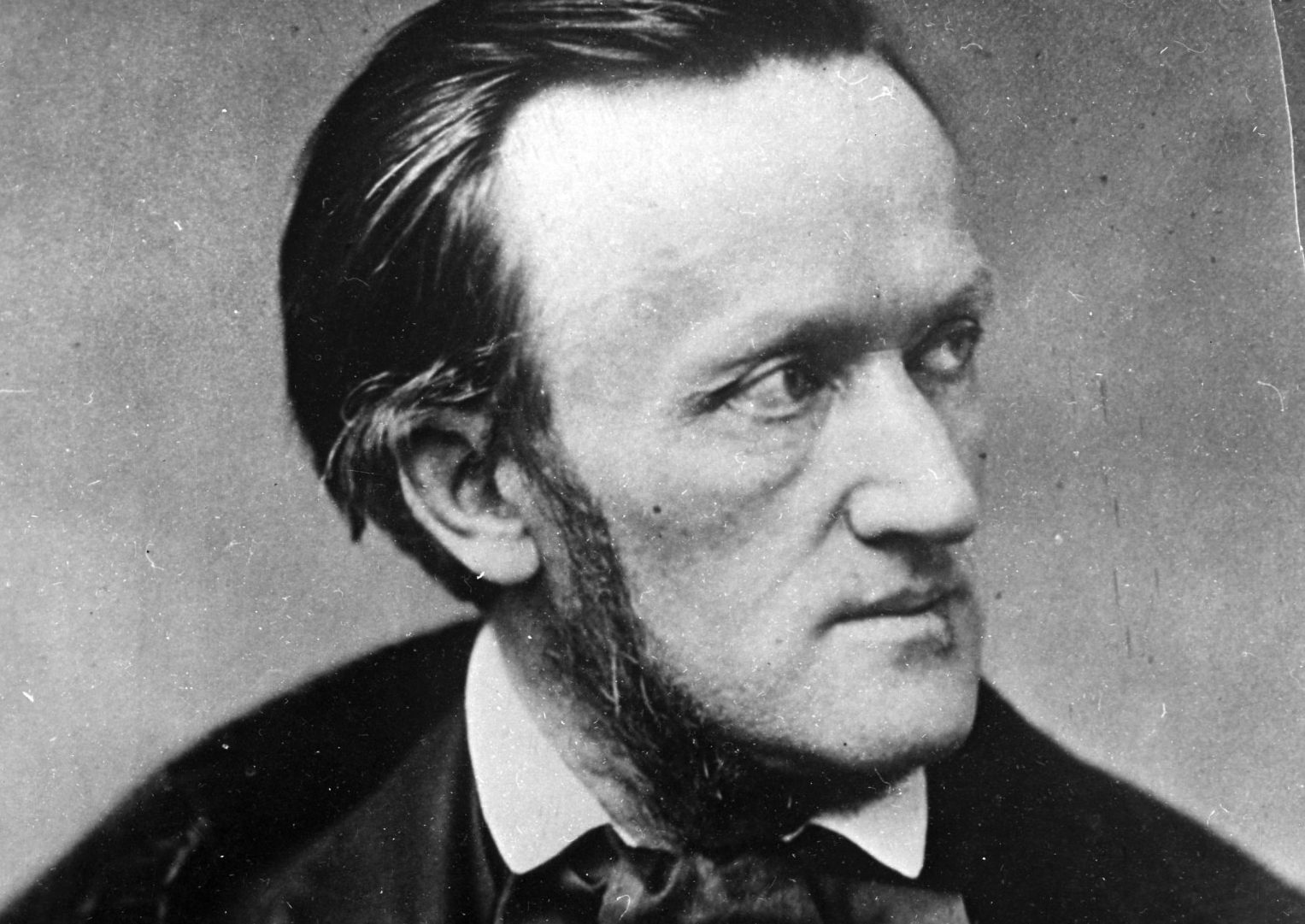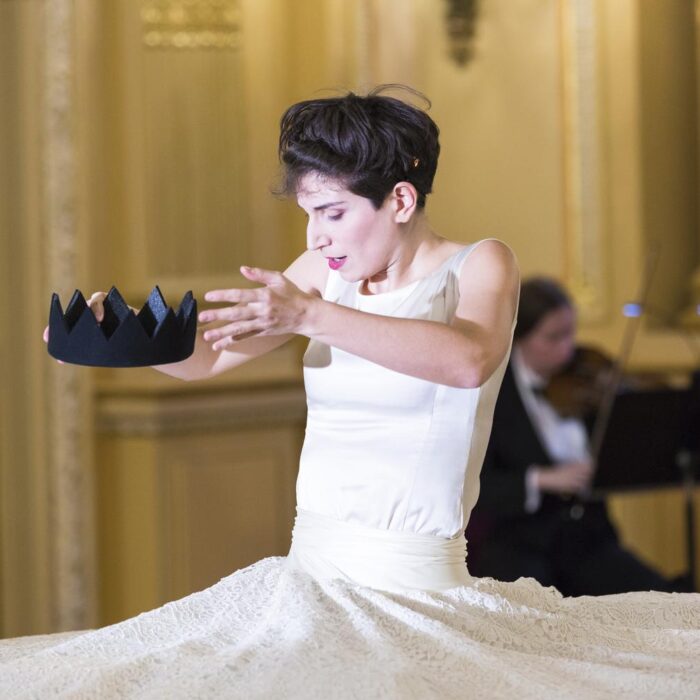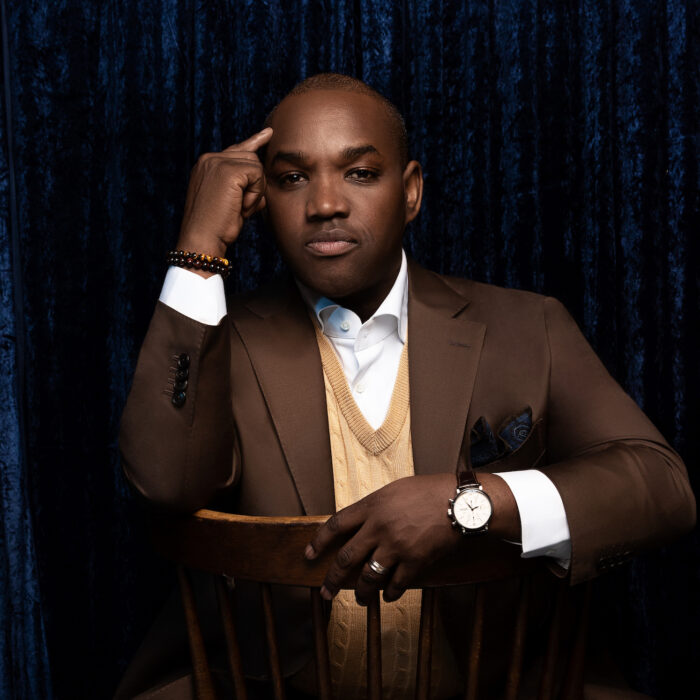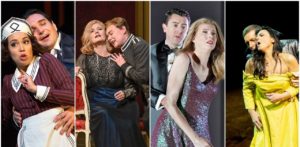
Best of 2019 – OperaWire’s Staff on the Best Performances of the Year
By Operawire Staff(Credit: Marty Sohl/Karen Almond-Metropolitan Opera/Ken Howard-Santa Fe Opera/ Gianfranco Rota-Donizetti Opera)
We hope that the end of your 2019 is a prosperous one and that the start of 2020 is even better.
As we look forward to the next calendar year, we are taking some time to reflect on the opera performances that defined 2019 for many of us. As with last year, many of OperaWire’s staff members are coming together to put a spotlight on opera around the world. Without further ado, here are our selections for the most memorable performances of 2019.
John Carroll
I’ve chosen two favorites for the year: one live and one broadcast.
Seattle’s “Rigoletto” in August was a captivating production by stage director Lindy Hume. Her resetting of the work in 2012, with the Duke modeled after former Prime Minister of Italy, Silvio Berlusconi, was a searing indictment of contemporary political and social corruption. When an updated production connects the themes of a classic work directly to our current daily lives as effectively as Hume’s did, it’s a success in my view. The spectacular set, lighting, and costume designs highlighted the contrasts in social and sexual power and the deft integration of elements of modern media machine (24/7 cable news, social media, mobile phones) made clear how this media circus becomes the sugar high of a corrupt state. Of course, this opera couldn’t have been a success (or my favorite of the year) if the performers were not well cast and up to Verdi’s challenges. Madison Leonard was a radiant Gilda, Liparit Avetisyant a cocky Duke, Ante Jerkunica a darkly smoldering Sparafucile, and Emily Fons’ a trashy and surprisingly funny Maddalena. While Lester Lynch didn’t soar vocally as Rigoletto, it was an empathic and emotionally resonant performance.
My other favorite was the Met’s broadcast in October of “Manon” in its Live in HD series. Living in Seattle, I appreciate the Met’s robust broadcasting platform as a chance to expand my local operatic experiences with a wide array of work created by singers, musicians, directors, and production designers at the pinnacle of their professions. “Manon” may be my most loved opera so there was zero possibility I’d miss it from the Met starring Lisette Oropesa. To hear a leading lady with a true lyric-coloratura soprano in the role was a joy and Oropesa proved an ideal match for this passionate coquette, looking and sounding sublime at every moment. The men in her life — sung by Michael Fabiano, Brett Polegato, and Artur Rucinski — were all outstanding foils for her allure. Laurent Pelly’s stylized production has some brilliant moments, but suffers from dreadfully stark set designs that convey nothing of the aesthetics or spirit of the Belle Epoque period he chose to set it in.
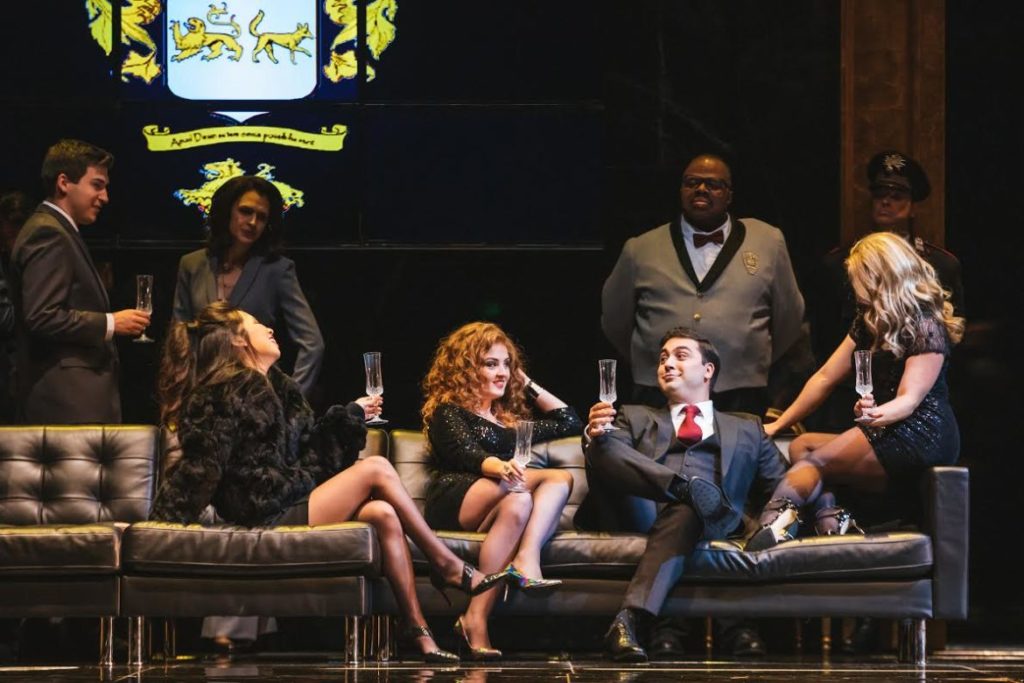
(Credit: Sunny Martini)
Matt Costello
Selecting one operatic experience as the most memorable – for this year, 2019 – is not as difficult as last year. And not because of a dearth of contenders for that honor. For example, the “Die Walküre” – all three acts, staged over two days at Tanglewood this past summer — was one of the most intense and powerful Wagner operas I ever attended.
Or the recent “Verdi Requiem” performed at the new and mammoth Hudson Yards “Shed;” MusicAeterna, led by Teodor Currentzis, made every moment of the choral piece as if new — visceral, exciting.
But the most memorable? That title would have to go to Saratoga Opera’s “Hansel and Gretel.” The sturdy, charming Humperdinck piece was turned into a multi-faceted, always moving experience. This was accomplished by pairing a keen sense of intimacy and minimalism, with the “magic” — if you will — of the old-school theatrics of plastic cut outs and silhouettes, all projected with a bit of hardware I thought wasn’t even made anymore — an overhead projector.
With the singers so close, fully engaged, and the small orchestra on stage, it was all worthy of your attention. The musical forces were perfectly matched with the seamless display of lights and shadow carried out by the inventive Manual Cinema performers. Days, even weeks later, I was still talking about. As I am now — and it makes me look forward to whatever Saratoga will attempt for the upcoming summer season.
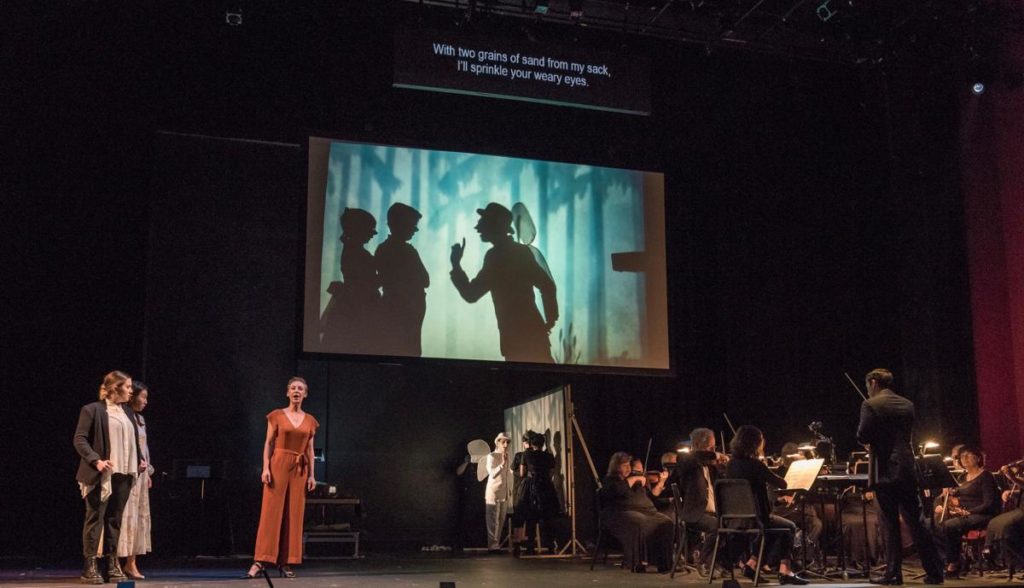
(Credit: Opera Saratoga)
Polina Lyapustina
For the second year in a row, the Bayerische Staatsoper has given me the best operatic experience of the year. Korngold’s “Die tote Stadt,” which is still fresh in my memory, was far above anything else I experienced all year.
It was an endangered rare chance to see the result of the collaboration between Kirill Petrenko and Jonas Kaufmann, who despite all the obvious differences, have become very close on the stage of BSO. Although we were told that we shouldn’t panic and that Petrenko will also pay some attention to opera in the future, we all understand that none of this will ever be the same mainly because Berliner Philharmoniker is definitely worth all the conductor’s energy. So to hear the Maestro’s interpretation of such a modern piece on the stage of BSO was especially valuable.
Both soloists, Jonas Kaufmann and Marlis Peterson gave outstanding performances, though they pursued completely different goals or, perhaps, were just interpreted differently. While Jonas Kaufmann hinted that he’s still on the very top, Marlis Peterson simply shone with marvelous acting and singing, stealing the attention from her famous co-creators.
Another remarkable project to mention is “Sun and Sea (Marina),” a Lithuanian modern opera which won this year’s Golden Lion, the top prize of the Venice Biennale. Confronting mainly visual art objects, this piece was highly acclaimed for its unusual staging, thought-provoking libretto, and a variety of performers who took part in the project.
The audience watched the opera from above as if observing animals in the aviaries. There were about 20 of them — just people who came there to catch the sea breeze and sunlight, all different but very familiar, even stereotypical. “O, the sea never had so much color!” one singer noted in her aria, and that’s what we could see around us — bottle caps and other trash coloring the sand of the pavilion. Behind the gentle melodies and slothful singing “Sun and Sea” spoke out about climate change and our despairing future, and people, who, unnoticed by themselves, brought the planet to this fatal state.
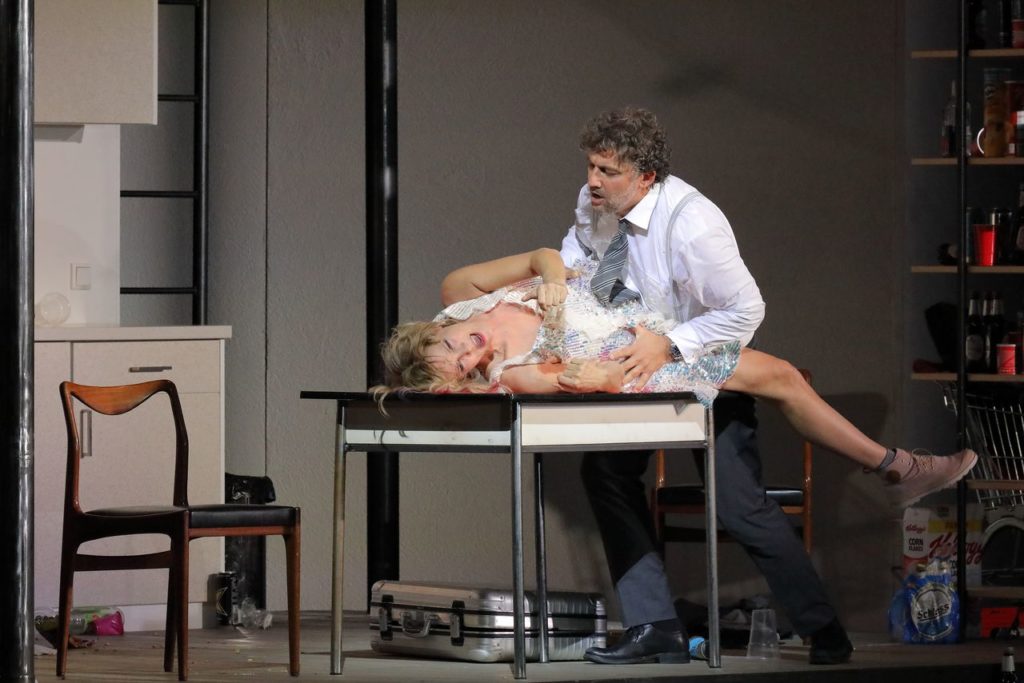
Credits: W. Hoesl
Elyse Lyon
I thought I would find it nearly impossible to choose one performance out of the hundred or so I’ve seen this year. After musing on it, however, the night that keeps coming to mind is the premiere of the Staatsoper Berlin’s “Betrothal in a Monastery,” conducted by Daniel Barenboim and directed by Dmitri Tcherniakov.
I’d never had a chance to see “Betrothal” before, and the experience of being introduced to Prokofiev’s opera by such a stellar conductor, orchestra, and cast was unforgettable. Music that might have seemed muddled and unconvincing in less capable hands, with its lack of traditional arias and its midcentury musical idiom, glittered and bewitched as performed by the Staatskapelle Berlin beneath Barenboim. The entire cast was delightful: Aida Garifullina enchanted as Luisa; Anna Goryachova was a splendidly unbalanced Clara; Violeta Urmana’s Duenna would have been memorable for the force of her personality alone; Stephan Rügamer, as Don Jerome, was delectably boorish.
Tcherniakov’s production, unsurprisingly, was divisive. The set, through all four acts, consisted primarily of a starkly lit room scattered with ranks of the Staatsoper’s own red-and-white seats. The plot of the opera was reimagined as a meeting of “Opera-Addicts Anonymous,” the characters given backstories told by means of projected text: the obsessive operagoer whose addition has alienated him from his family; the embittered critic who’s fallen out of love with opera; the disillusioned singer who wants nothing but to leave the world of opera forever. In projected videos, done in the style of cheap infomercials, recovered opera addicts gave earnest speeches about how much better and happier their lives were without opera.
In the final chorus, however—following a droll trick ending, during which a curtain descended just long enough for a handful of audience members to rush out to be first in line at the coat check—the apparent bitterness toward opera was completely turned on its head. The stage filled to bursting with scores of beloved opera characters, richly dressed in copies of costumes from beloved historical productions: Tosca, Brünnhilde, Boris Godunov, Papageno, Falstaff, Otello.
I did not necessarily find it to be the most successful Tcherniakov production I’ve had the pleasure of seeing, but I’ve always found Tcherniakov’s oeuvre to be exciting, thought-provoking, and ultimately deeply rewarding. As an insightful friend remarked, the production was far more loyal to Prokofiev’s work than it might appear at first glance: “Verlobung” is essentially a love letter to opera, with its playful use of timeworn operatic tropes, and Tcherniakov’s production, too, was essentially a love letter to opera. Both poke fun at the genre, both criticize it and turn it on its head, but their overwhelming message is an affirmation of powerful love for and devotion to a centuries-old art form.
What made the night so especially memorable was the sense of community it created. In the lobby, following the performance, I found myself happily chattering with complete strangers, naming the characters depicted by the chorus members and talking fondly about legendary singers. A few days later, during the intermission of another Staatsoper production, I stumbled into a conversation with some of the backstage crew who were taking a smoke break on Bebelplatz: laughing over the premise of Tcherniakov’s production and over our shared addiction to opera. It was a powerful reminder of how opera can bring us together.
As Tcherniakov’s production hints, there are times when opera can be a lonely pursuit. At other times, however, it can create a sense of profound connection—not only with the past, and with four hundred years of tradition and growth, but with a community of fellow addicts that spans countries and continents.
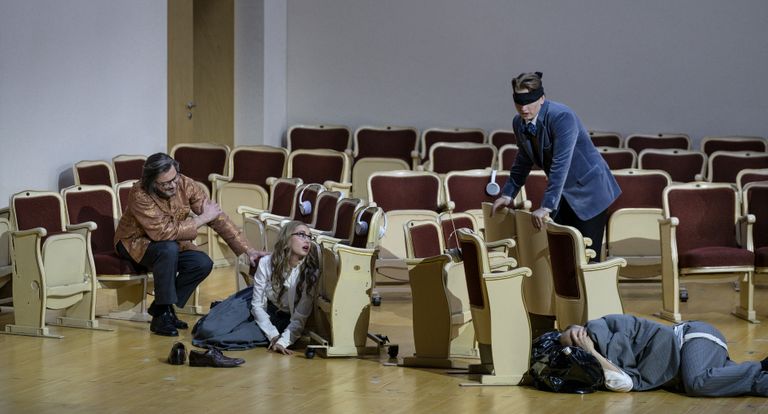
Credit: Ruth and Martin Walz
Logan Martell
The best performance I’ve seen this year was the Metropolitan Opera’s “Le Nozze di Figaro.”
Luca Pisaroni and Nadine Sierra led a splendid cast of artists, with their respective talents showing clearly through almost every number. We all know the music, we all know the jokes, but the cast nonetheless kept the audience laughing, sounding great all the while. Such performances, in my opinion, make for shining examples of what opera can achieve through musical and dramatic excellence.
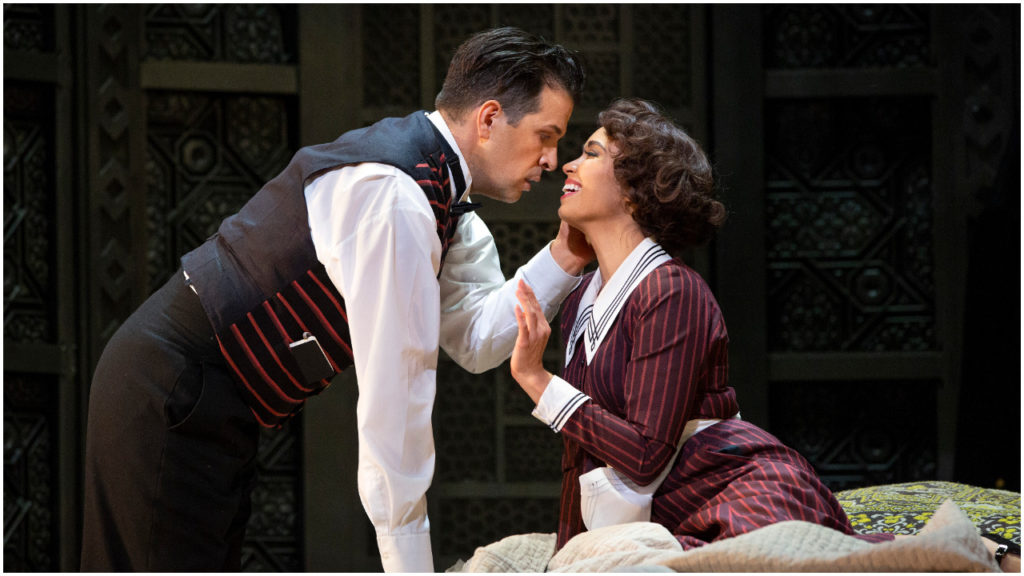
(Credit: Metropolitan Opera)
Alan Neilson
During the year, I attended 45 staged performances, of which there were many highlights that have etched themselves in my memory. In some instances this was due to a standout singing performance, as in the cases of Joyce El-Khoury’s Elisabetta in the Welsh National Opera’s production of “Roberto Devereux,” or countertenor David Hansen’s Epitide in Broschi’s “Merope” at the Innsbruck Early Music Festival.
Other performances stood out for the director’s imaginative take on a work, such as Helen Malkowsky’s bleak “Mignon” at the Tiroler Landestheater or the Welsh National Opera’s production of Heggie’s “Dead Man Walking” headed by Lucia Cervoni as Sister Helen Prejean and Morgan Smith as Joseph De Rocher. My finest musical experience of the year came at the Verbier Festival with Valery Gergiev conducting Strauss’ “Die Frau Ohne Schatten,” featuring Emily Magee, Evelyn Herlitzius, Miina-Liisa Varela and John Lundgren.
It was also a marvelous year for contemporary opera, of which I managed to catch eight productions. What is so noticeable about contemporary opera is not simply the high quality of the music, but the way in which they explore complex issues and human psychology on such a serious and deeply informed level. Particularly impressive was Micha Hamel’s “Caruso a Cuba” at Amsterdam’s Opera Forward Festival, which has a strong narrative and is musically accessible.
However, my favorite performance of the year has to be Brian Irvine’s new opera, “Least Like The Other, Searching for Rose Kennedy,” staged by Irish National Opera at this year’s Galway’s International Arts Festival. This highly innovative work is based on the horrific true story of President Kennedy’s sister, who without the rest of the family’s knowledge was whisked off by her father, Joseph Kennedy, for a lobotomy because she experienced minor learning difficulties, and was therefore perceived as being not like her siblings. She spent most of the rest of the rest of her life in a medical institution.
It is written for a single singer, with two speaking roles for actors and a narrator, and follows a semi-linear time line. The work has a powerful impact, both emotionally and intellectually and as a piece of theatre is spellbinding. No small part in its success must go down to mezzo-soprano, Naomi Louisa O’Connell, whose intelligent and nuanced portrayal of Rose Kennedy was stunning. It is inconceivable that this opera will not be revived in the near future, it is what theater is meant to be!
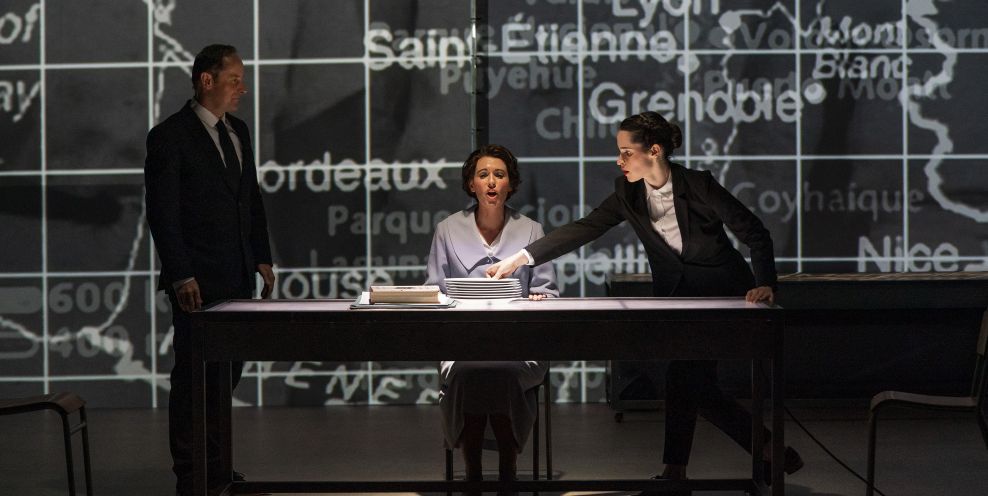
(Credit: Irish National Opera)
Maria Nockin
My favorite performance of 2019 was Santa Fe Opera’s rambunctious version of Mozart and DaPonte’s comedy, “Così fan tutte.” Director R. B. Schlather had a quartet of physically and vocally able young singers and he made excellent use of their talents. By performing stunts while they were singing, they showed off some unexpected abilities.
In this performance, every aria was acted as fully as physically possible and almost no one sang with feet firmly planted on the stage. Amazingly, while singing from unexpected positions, these artists acquitted themselves extremely well.
Soprano Amanda Majeski was a most capable Fiordiligi whose high notes turned to silver as she romped around the stage and her wide vocal range easily encompassed the scope of Mozart’s music. Tenor Ben Bliss’s charisma and distinctive voice made him a charming Ferrando. His most capable and energetic co-conspirator, Jarrett Ott as Guglielmo, sang with resounding low notes that delineated his well-drawn character. In this concept, Despina was an older, wiser servant who remained right side up. Portrayed by the veteran Canadian coloratura soprano, Tracy Dahl, Despina captivated the audience with less exhausting antics. As Don Alfonso, veteran baritone Rod Gilfry created a believable character in the midst of the wild and irreverent actions such as pouring liquid on the heads of the other singers
Conductor Harry Bicket played the overture at a brisk pace and kept the counterpoint flowing. His tempi matched the energy the director demanded of the performers and the result was a clean, crisp rendition of the score. When Don Alfonso triumphantly declaims “Così fan tutte,” (“All women are like that”), we may not agree, but since the object of this performance was fun for all, the thunder of applause after the finale proved that the goal had been reached.
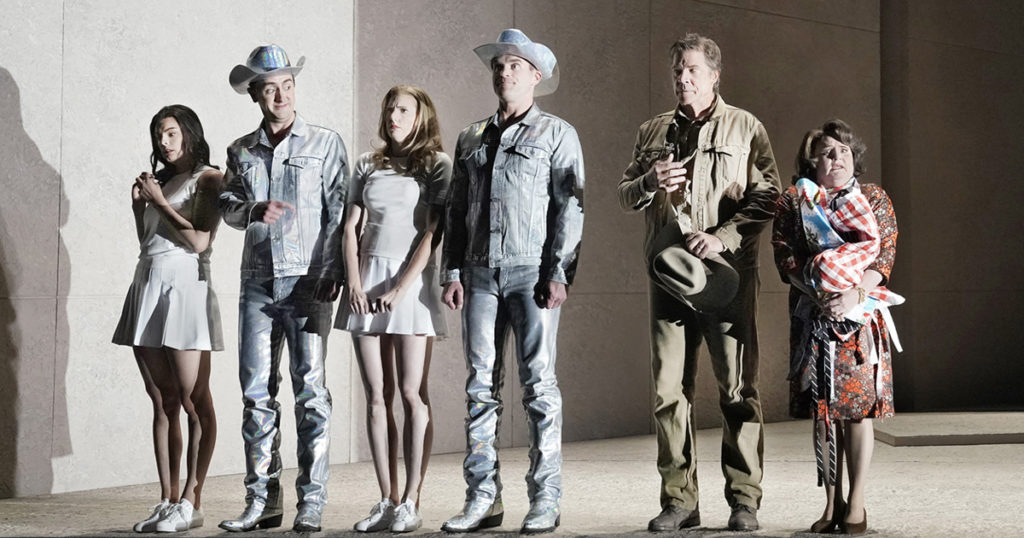
Credit: Ken Howard/Santa Fe Opera
Chris Ruel
The summer of 2019 expanded my opera experience through exposure to many new and indie productions; so, instead of going with one of the big shows I’ve attended this year, I will stay within the realm of the contemporary.
My 2019 favorite opera goes to “Chunky in Heat,” staged by Experiments in Opera with music by six composers (Jason Cady, Paula Matthusen, Erin Rogers, Aaron Siegel, Shelley Washington, and Matthew Welch), and libretto by novelist and short story writer A.M. Homes. “Chunky” tells the coming of age story of Cheryl, a.k.a. Chunky, as she navigates growing up in Southern California, confronting everything from burgeoning sexuality and body issues to the emptiness of vanity and the pervasiveness of technology that records every moment in our lives.
“Chunky,” was funky—especially musically. With such a diverse range of composers contributing to the score, it was a delightful mishmash of styles that worked. The performances by Timothy Stoddard—singing three roles—and Sarah Daniels as Chunky (Cheryl) were as humorous as they were moving.
While all the above made “Chunky” a stand out opera, there were personal connections that made the production stick. Having lived in Los Angeles, the show brought recollections of the positive and the negative aspects of life in Southern California. But there was something else, something deeper, and it came about through my interaction with librettist A.M. Homes.
My interview with her for OperaWire not only provided deep insight into the story and characters but also pushed me as a fiction writer, encouraging me to take on controversial subjects and to try something new—to just “go for it” as Homes did with her libretto.
“Chunky” punched well above its weight, and for that, it stood above many of the more glitzy productions of 2019.
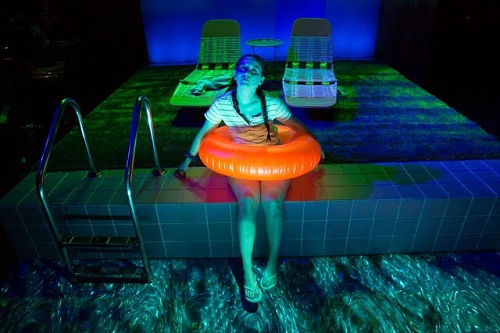
(Credit: Reuben Radding)
David Salazar
There have been a number of incredible opera experiences throughout 2019, including a fantastically directed “Don Giovanni” out of Paris, Javier Camarena’s iconic vocal fireworks in the Met Opera’s “Fille du Régiment,” Bare Opera’s inventive “María de Buenos Aires,” and a gut-wrenching revival of “The Queen of Spades” in New York very recently. But in the end it came down to three experiences that really stood out, all from New York’s famed theater.
The first of these was a revival of “Dialogues des Carmélites” starring Isabel Leonard, Karita Mattila, Adrianne Pieczonka, and Erin Morley, among a number of fantastic artists. It was a wondrous rendition of an opera that deserves more reps on the U.S. most famed stage.
The same can definitely be said for my second choice (and recent news has established that this will be the case) – the Met’s “Akhnaten.” Starring Anthony Roth Costanzo, but truly dominated by Zachary James, this Philip Glass opera was a true revelatory experience that hypnotized in a way that only “Dialogues” had managed to that point in 2019.
These two works benefited in many ways from my limited exposure and experience with them in a theatrical setting. This was my second production of “Carmélites” and first-ever of “Akhnaten.” Familiarity often does breed contempt, as those who have experienced something many times are (consciously or unconsciously) holding repeated experiences against one another.
It is for that reason that in the last week, I shifted my choice for this list and put the Met’s recent “Der Rosekavalier” revival right at the top. This is an opera that can definitely never be called a rarity as it remains a fixture in theaters around the world. It is arguably Strauss’ most recorded work and undeniably one of the finest in the repertory. But it is also one hell of a challenge for anyone who endeavors to present it. And given its size, it isn’t always an unmitigated success with some of the pieces never quite coalescing.
But in this case, as I wrote in my review, it felt like the entire opera’s musical shape was under one unified musical conception. We often talk about opera productions as the catalyst for thematic and emotional unity in a modern day production, but Sir Simon Rattle transcended that by creating a unified musical whole that bypassed even the deeply flawed production by Robert Carsen. It certainly helped that he had four top notch singers in the major roles, giving their very best from start to finish.
“Der Rosenkavalier” is a long opera, but this performance made me forget about time, entrancing me in its poignant story of love, loss, and growth.
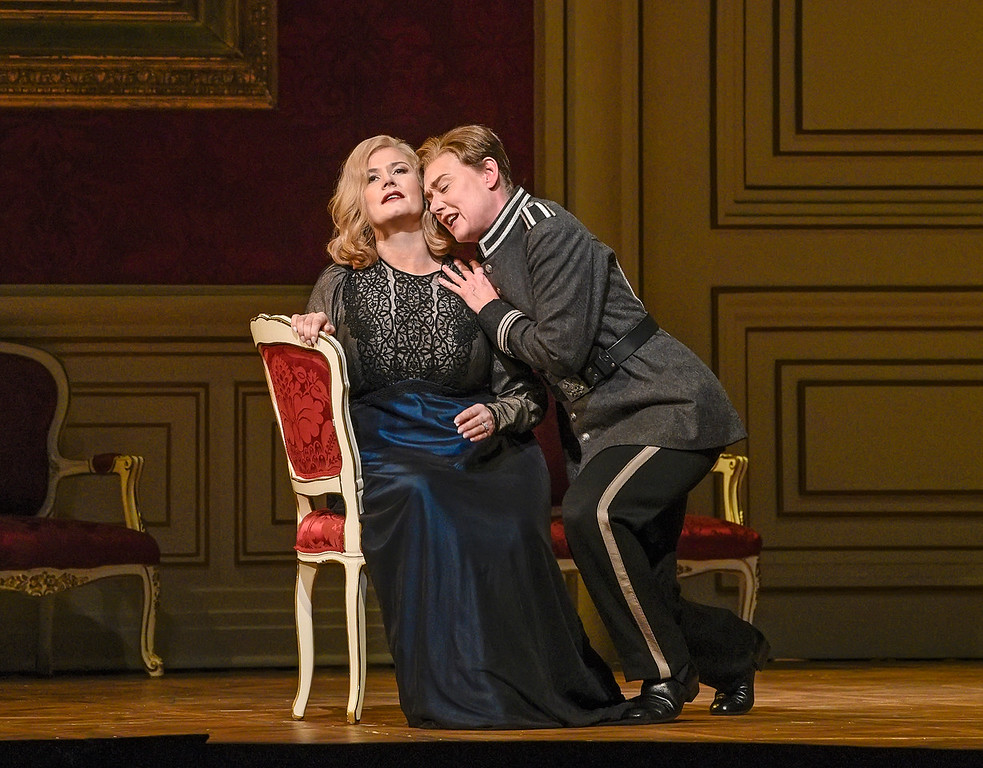
(Credit: Karen Almond / Metropolitan Opera)
Francisco Salazar
This year was filled with incredible operatic performances. From Anna Netrebko’s riveting “Adriana Lecouvreur,” Javier Camarena’s historic “La Fille du Régiment,” a fun filled “Falstaff” and a star turn from Stefan Vinke in “Siegfried.” There was also the superb premiere of “Ahknaten” at the Metropolitan Opera and the North American premiere of “Ali Baba” at the Opera Southwest, which showed promising voices and a growing company producing unique works.
But it was at the Donizetti Opera Festival where I saw opera at a completely different level. First there was “L’Ange de Nisida” which got its first production in a truly unique concept with a top-notch cast of rising stars.
And then there was “Lucrezia Borgia,“ which was given a riveting and explosive performance that showed opera could be suspenseful, timely, and dramatic. Riccardo Frizza led Donzietti’s score with urgency and subtly exploring the composer’s masterful use of the winds and strings. Carmela Remigio was fully invested in the title role, singing with precise coloratura and creating a truly complex characterization of the eponymous personage. By the end of the opera there one felt sympathetic for her tragedy. Xabier Anduaga’s Gennaro was a star-making performance that announced his true arrival on the big stage, while Marko Mimica and Varduhi Abrahamyan displayed magnetic stage presence and mastery in the Bel Canto style.
Andrea Bernard’s production was the perfect balance of minimalism with traditional aspects mixed with some modern touches. He was not afraid to go to the dark places the opera calls for and created vivid performances that generated violence and lust. All in all, this was a breathtaking evening that will go down as one of the definitive modern productions of Donizetti’s masterwork and one that I will not forget in the years to come.
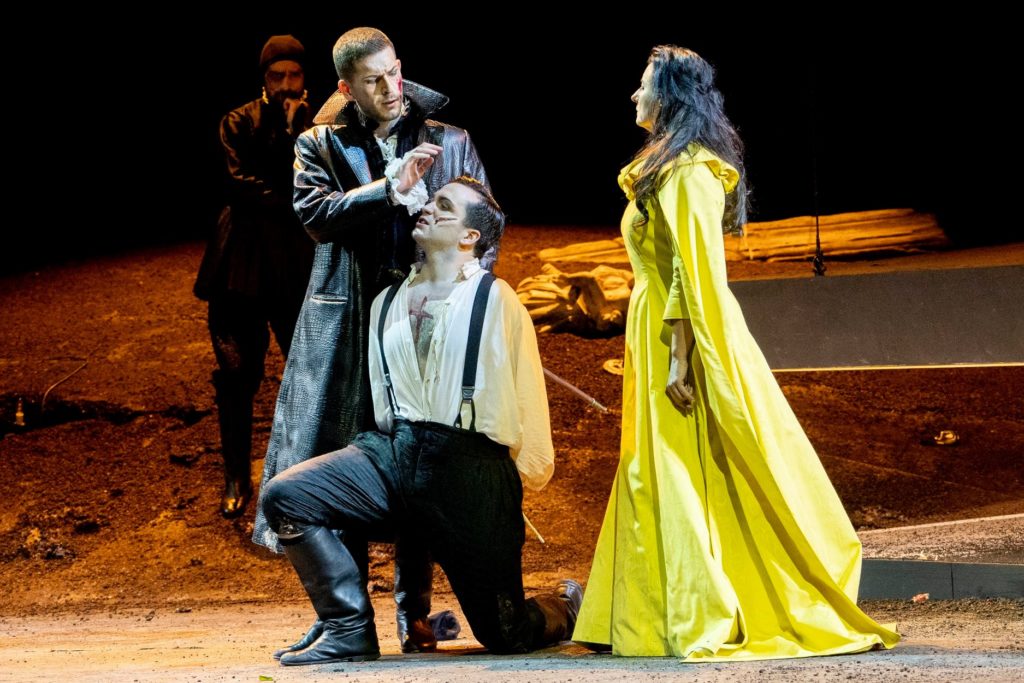
Credit: Gianfranco Rotal
Lois Silverstein
This year was full of rich musical performances. From small opera to grand, 2019’s performances on the West Coast could hardly be bested.
Of the grand operas in San Francisco, the opening night revival of Britain’s opera “Billy Budd” did not fail to shine. Under the artistic skill of Michael Grandage, the production brought us Britain’s opera, based on Herman Melville’s novella, to the stage in all its glory. Idealism and morality, truth and puritanical narrowness, were spread out thick and fine throughout the production as designed by Christopher Oram. He set the “hulk of a set,” the HMS Indomitable, and provided the container for the complex, psychological drama. The rest of the creative team of director Ian Rutherford and David Manion executing original lighting design by Paule Constable brought to bear the intensity as did the all-male cast consisting of 75 voices in chorus and solo, including eight boys from the Ragazzi Boys Chorus. Both set and singers created a quasi-cathedral setting. Mr. Redburn, Mr. Flint, Mr. Ratcliffe, sung by Philip Horst, Wayne Tigges, and Christian Pursell respectively, successfully highlighted the hierarchial structure that hammered the system into place.
The three main soloists delivered fine performances. Baritone John Chest as Billy Budd was handsome, good, pure, singing with sonority and moving conviction. The malevolent Claggart, sung by bass-baritone, Christian Van Horn, showcased his envy and longing for the innocent Budd. And tenor William Burden, singing “Starry Vere,” exhibited helplessness that dictated more of the tragedy than we first want to admit. Lawrence Renes’ conducted with aplomb. Would that Melville himself had lived to see what Britain was able to plumb of this penetrating story, and in this stunning San Francisco revival of the dark, penetrating drama.
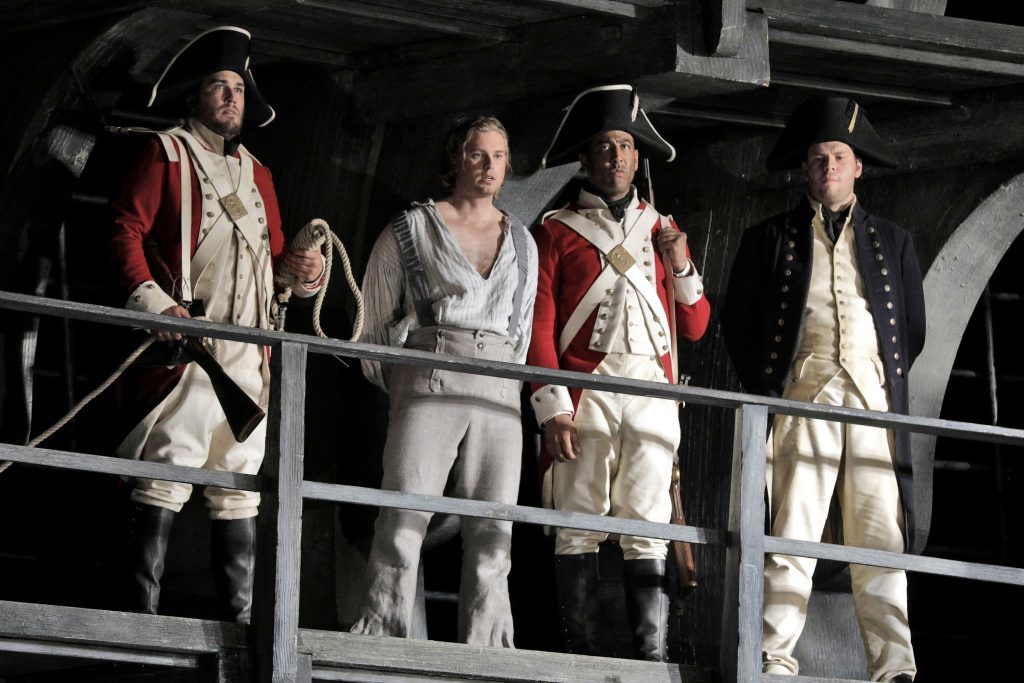
(Credit: Cory Weaver / San Francisco Opera)
Mauricio Villa
The performance of Verdi’s “La Traviata” at Palais Garnier on the 15th of September 2019 has been the highlight of this year’s season for me.
An extraordinary cast with a clever, meaningful and moving new production by Simone Stone made this evening something unforgettable. It was Pretty Yende’s debut in the role, but based just on the pathos, emotion, and vocalism she put into the role, you would not believe that she was portraying this famous suffering heroine for the first time. The score suited her voice as if it has been written for her, managing the coloratura and dramaticism needed to portrayed such a role.
Benjamin Berheim was a pleasant discovery for me; with a sweet warm timbre he was able to inspired all the feelings that the character of Alfredo demands. Ludovic Tezier has sung the role of Germont for many years and demonstrated his artistry and immaculate technique as well as his astounding voice production.
Simone Stone’s new production reflected “La Traviata” in modern times, making this 19th century drama something we could all relate to, with the oniric ending of Violetta disappearing in fog during her dead scene. It was a remarkable and unforgettable performance.
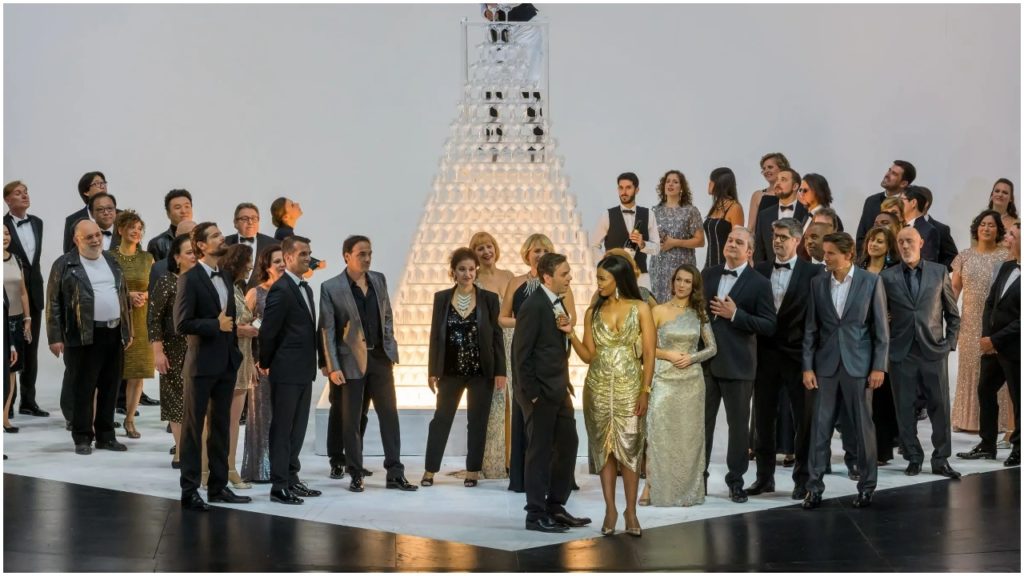
Dejan Vukosavljevic
I have enjoyed many great productions in 2019, all over the operatic world. Thus, it is fairly difficult to choose the best production of the year, but if I really had to choose, I would wholeheartedly go with the production of Richard Wagner’s opera “Rienzi, der Letzte der Tribunen” at the Deutsche Oper Berlin. The third and a very rarely performed opera of a Sorcerer from Bayreuth, “Rienzi” has always been considered a rare treat for every true Wagnerian.
The Deutsche Oper Berlin staged “Rienzi” for the first time in 2010 in a fantastic and rich production by Philipp Stölzl. This 2019 rendition saw the cast with Torsten Kerl in the title role, while Martina Welschenbach and Elisabeth Teige alternated in the role of Rienzi’s sister Irene. Torsten Kerl proved to be in top heldentenor form, while both Welschenbach and Teige were persuasive and completely up to the task as Irene. Mezzo-soprano Annika Schlicht gave a breathtaking performance in the role of Adriano, rarely seen heroic singing that had the audience holding on to their seats. The rest of the cast aligned perfectly with these top performances by the principals (Andrew Harris, Stephen Bronk, Clemens Bieber, Derek Welton and Dong-Hwan Lee).
However, it was a non-intentional event that gave an almost supernatural flavor to this latest rendition of “Rienzi” at the Deutsche Oper Berlin – the rare treat of two artists in the role of Irene. In many opera houses, it would have also been regarded as a very undesireable one, but this was far from the case here.
During the last performance on May 10, soprano Elisabeth Teige was vocally indisposed. Still, she was able to appear on the stage as a scenic Irene, while soprano Camila Ribero-Souza was singing the role from the right side of the stage. She was summoned to Berlin in a last-minute call. The two artists ladies were 100 percent synchronized in this unexpected development, without any noticeable lapses.
Two sopranos instead of one? I had a true feeling that I seriously underpaid my ticket for that final evening performance, and happy to acknowledge that publicly. “Rienzi, der Letzte der Tribunen” at the Deutsche Oper Berlin has the operatic crown of 2019, in my opinion.
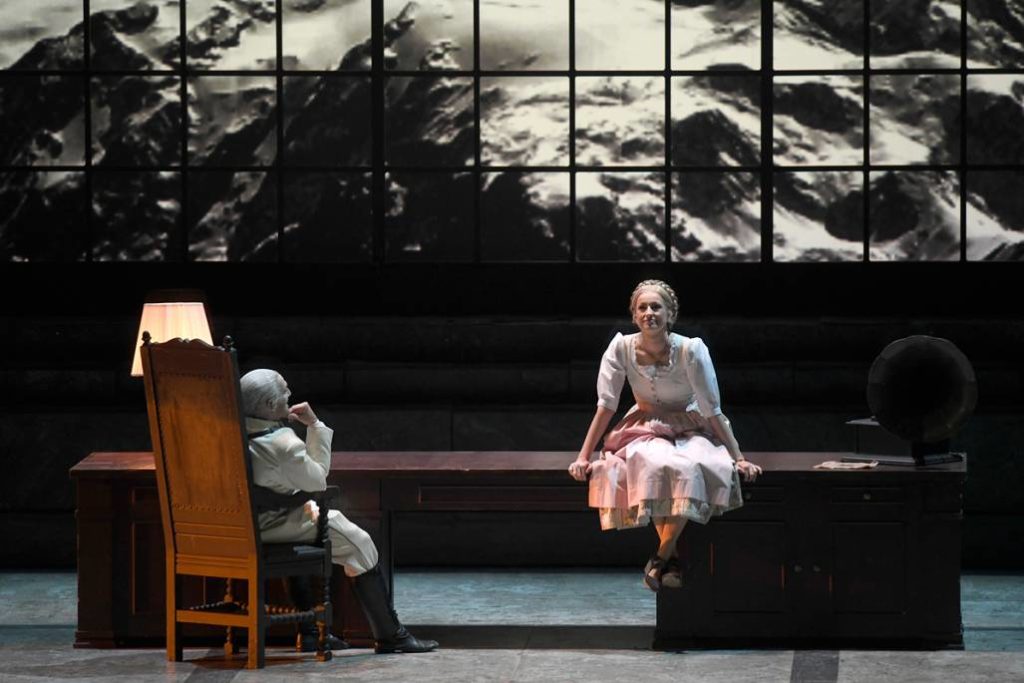
Credit: Bettina Stoss
Categories
Special Features